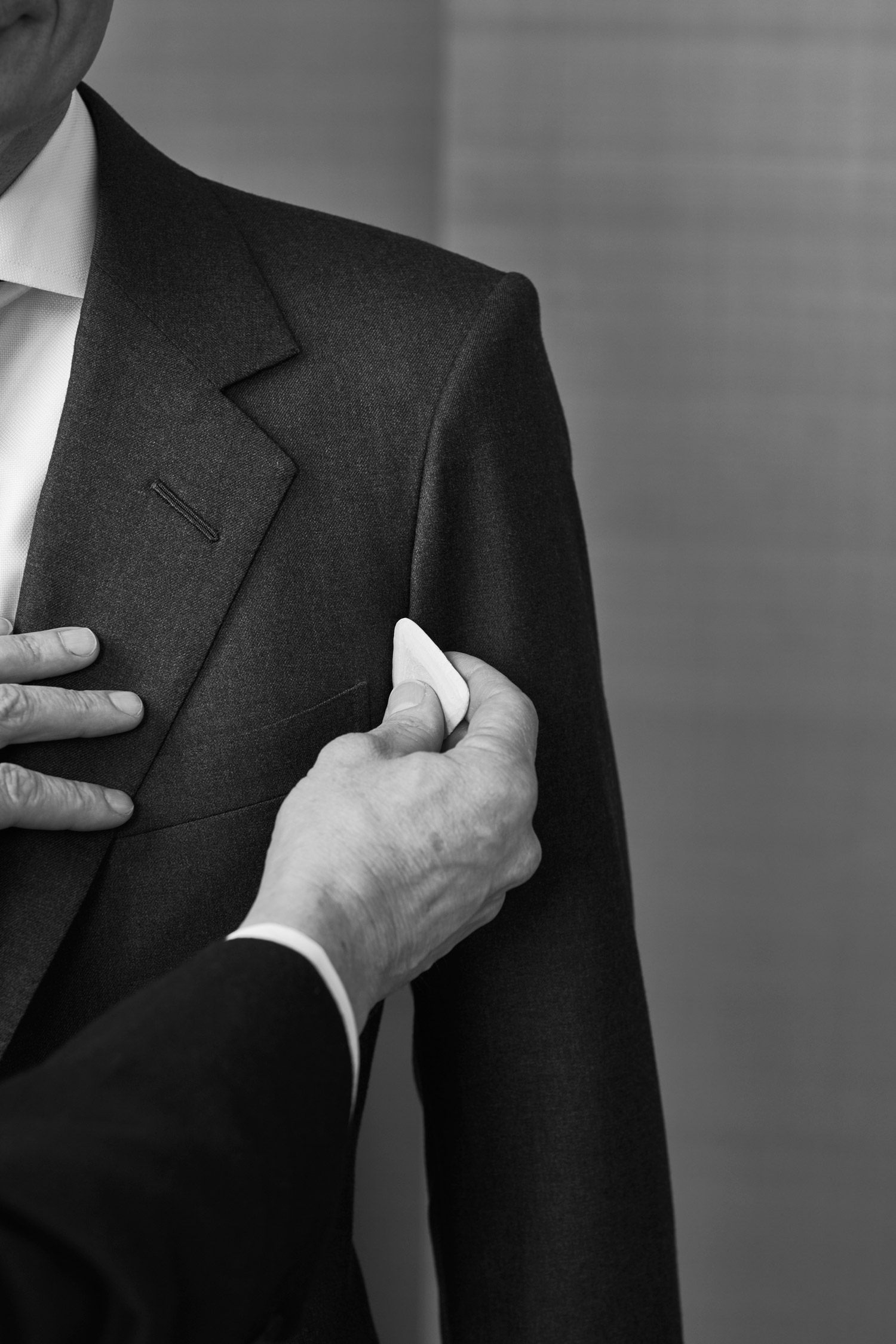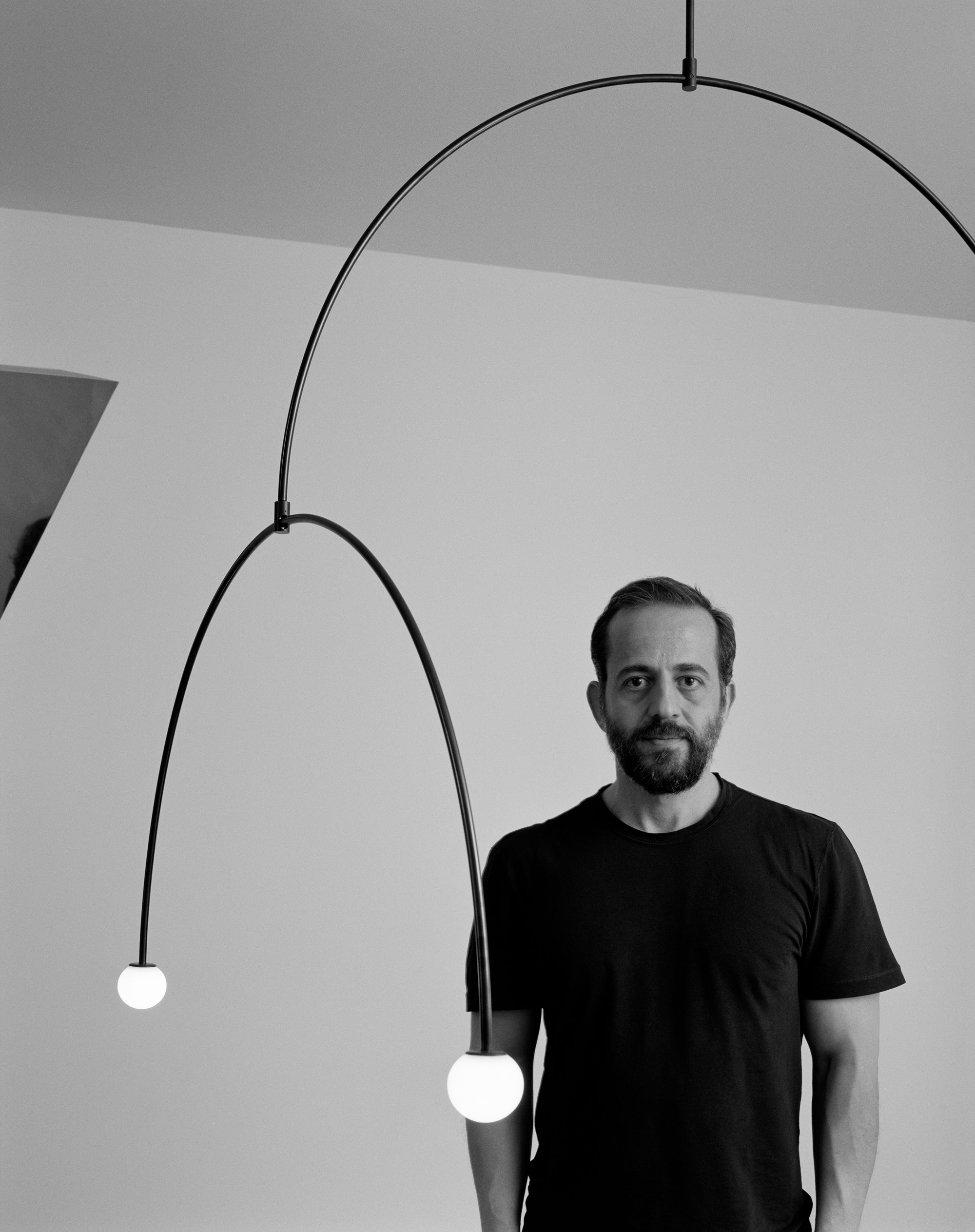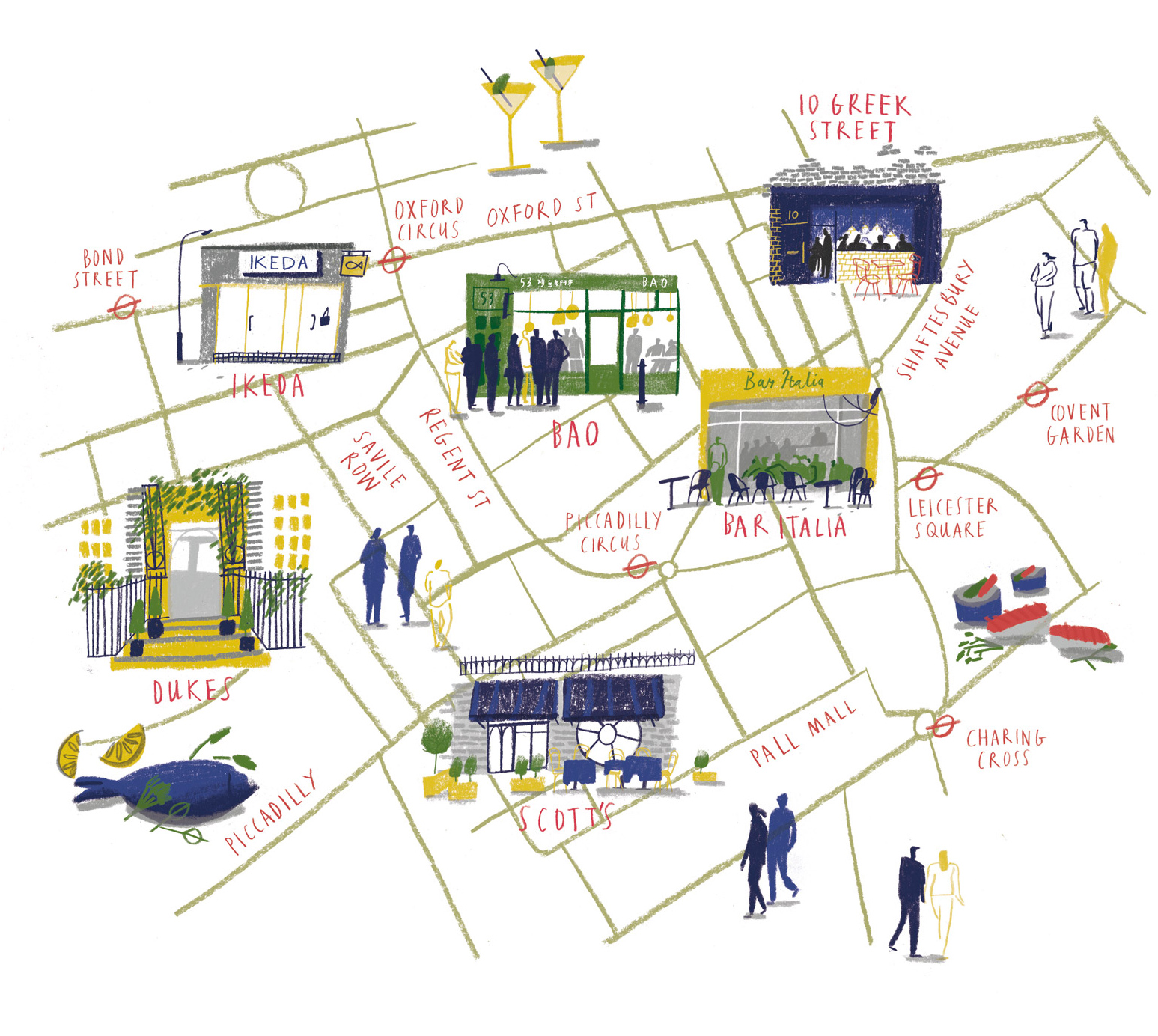There are still a few hours until lunchtime at Fera, the Michelin-starred restaurant at Claridge’s hotel in London’s Mayfair, is empty save from the staff, who are already doing their ties in the mirrored surfaces of the Art Deco dining room and putting the hoover round. Head chef Simon Rogan comes in slightly late and fried, on account of the train problems that also meant he didn’t get home to his house in Little Hampton last night until almost 2am after finishing his shift. While his face betrays a bit of scruff — 2 o’clock shadow, if you will — his double-breasted chef’s jacket is nevertheless immaculately white.
Given Claridge’s stellar reputation for five-star service, one might imagine that the jacket was waiting, pristinely laundered, for Rogan’s arrival, whereupon a butler — maybe two — helped him into it. The truth is somewhat different. “I travelled up wearing it under my jumper,” he says. “I’ve got a chef’s jacket on most of my life, to be honest.” He will keep it on later today when he travels up to Cumbria, where he has two restaurants and a pub, via his two restaurants in Manchester. “There isn’t an unveiling of the jacket where I put it on and I’m ready for work,” he says. “I’m constantly working, even when I’m not in a chef’s jacket.”
Indeed, when Rogan was first invited to Claridge’s to discuss succeeding Gordon Ramsay, he was inappropriately dressed for the occasion in a baseball cap. “I had shorts on as well, actually: combat shorts, trainers and a cap,” he admits, smiling. “I’d been to Berlin and had to come straight from Manchester Airport.” In fairness, his sartorial standards are usually much higher, with a “strict uniform” for front of house, “good-quality jackets” for chefs and even grooming regulations. “I’m always a little bit rough-shaven but everybody else is tidy: no long haircuts,” he says. It’s not just about appearances but also attitude: “In my mind, that breeds excellence and productivity.” He’s happy, however, for customers to be “comfortable and relaxed”, even though Rogan’s Manchester restaurants — The French and Mr Cooper’s House and Garden — are in the Midland Hotel where the Beatles were famously turned away for not wearing ties. “Obviously we don’t want people coming in wearing flip-flops or Speedos, but it’s like taking photos: as long as it doesn’t disturb the other diners,” he says. “We’ve seen some right outfits…”
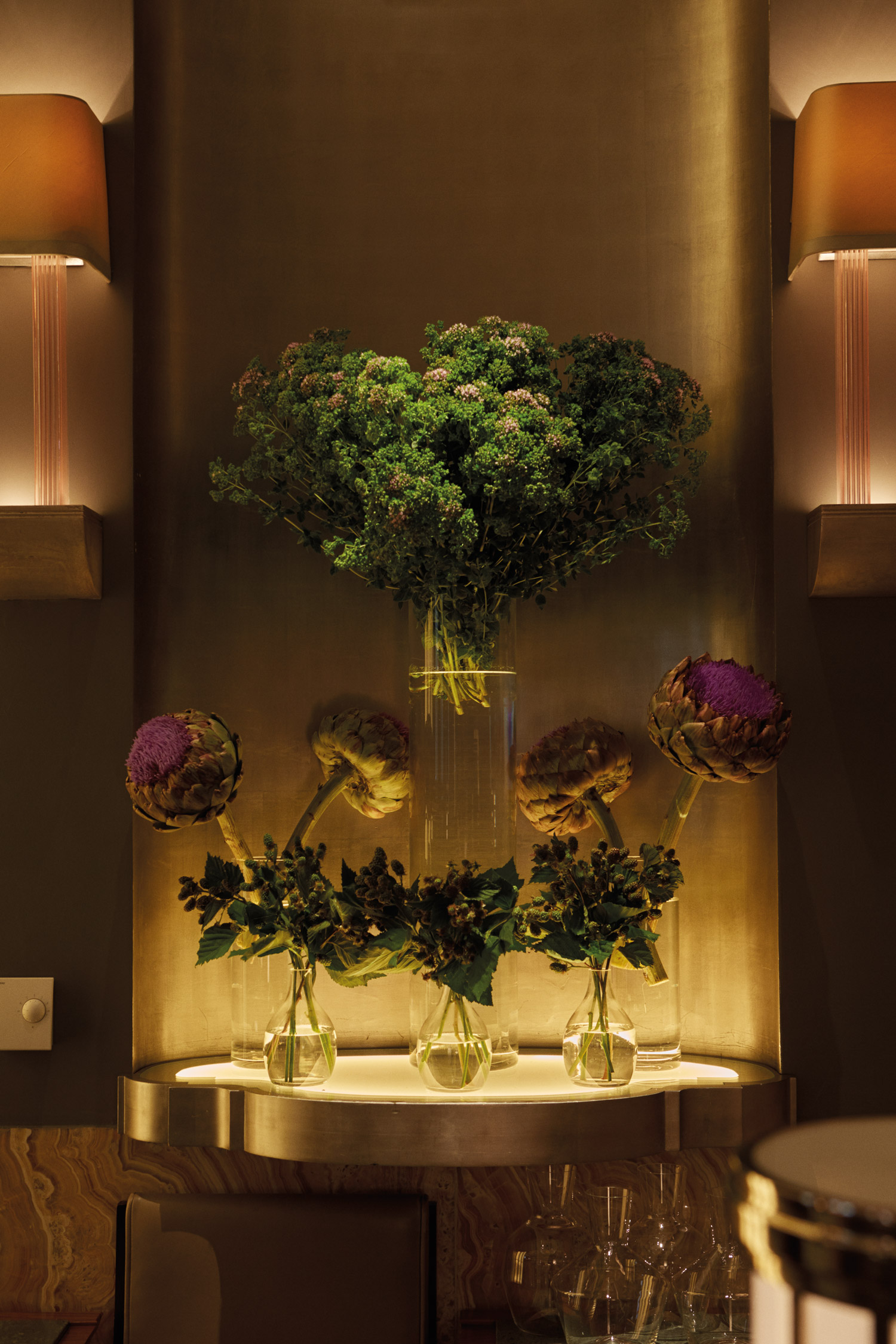
Rogan has tightened up his own personal dress code over the years. “I’ve definitely smartened up the clothes that I wear,” he says. Maybe it’s exposure to the well-heeled surroundings of Claridge’s, or just his increasing maturity. “I think I’m getting a bit old now for the leisurewear that I’ve traditionally worn,” Rogan says. “Even Stone Island, which I’ve always had a bit of a thing for, is probably now a bit young for me.” An English Cut bespoke suit is more befitting of a man of his stature, in several respects. “I’ve mainly been an off-the-shelf sort of guy, which with my odd body is probably not the best thing,” he says. Then there’s his age and professional standing, for which getting a suit made could be seen as an appropriate rite of passage. “I think it is,” he says. “I’m going through all the things, one by one, that I wanted when I got older: I’ve got my cars [a Porsche and a slightly more practical Land Rover]. I’ve got my watch [a Rolex Sea-Dweller] Personally tailored suits have largely eluded him until now. “I think I’ve only been measured up once in my life, for a posh wedding where everyone was fitted out with the same suits, so it’s a bit of a novel experience,” he says. “But it’s nice to treat yourself like that.”
From the menu of options — and with Tom’s recommendation — Rogan chose a single-breasted, two-button jacket in a grey Hardy Minnis fabric, a suit for dinner, if not a dinner suit per se, as “that’s what I mainly wear one for: presentations, award ceremonies.” Small wonder: L’Enclume, the restaurant that Rogan opened somewhat unpromisingly in the middle of nowhere — well, Cumbria — in 2002, picked up its second Michelin star in 2013 and was named the best in the country by the Good Food Guide 2014 and 2015. Now a true destination restaurant, L’Enclume has kick-started a whole cottage foodie industry in the village of Cartmel, including — but not limited to — Rogan’s other, less formal restaurant (Rogan & Co) and pub (The Pig & Whistle). As fellow migrants to Cumbria, he and Tom presumably had plenty to talk about. “Yeah, just slagging off London,” he laughs. “No, not really. We’ve got the best of both worlds. We’re in the capital, with lots going on. When we need to get out, we can bomb up the motorway — well, you never “bomb up” that motorway — or jump on the train and enjoy peace and quiet. Then when we’re fed up of that, we get back to London again. It’s quite privileged really.” Even allowing for the odd traffic jam or rail fail.
Rogan’s culinary journey began in his native Southampton, where his dad worked in the fruit and veg wholesale markets. “I used to go down there and meet him,” he says. “There were all these forklift trucks carrying pallets, and a real fruity-veg smell about the place. I really loved it.” Thus he was exposed at a young age to exotic ingredients, particularly those contained in the goody bag that his dad brought home from work every week. “Invariably it would be stuff I hadn’t seen before: mangos, paw-paws, kiwis even,” he says. “Most of the time it would just sit in the fridge and go off, because we didn’t know what to do with them. That got the inquisitive nature in me to read up about them. I don’t like wasting.” Rogan got into cooking at home, and took it as an option at school, but his hottest career prospect was football: he had trials at Chelsea and an offer of a training contract from Fulham. “I was pretty good,” says Rogan. “But never disciplined enough: I liked girls and booze too much.” In some ways, that’s an unlikely admission from a hardworking chef: “I suppose if I really put my mind to it… But then everyone says that.”
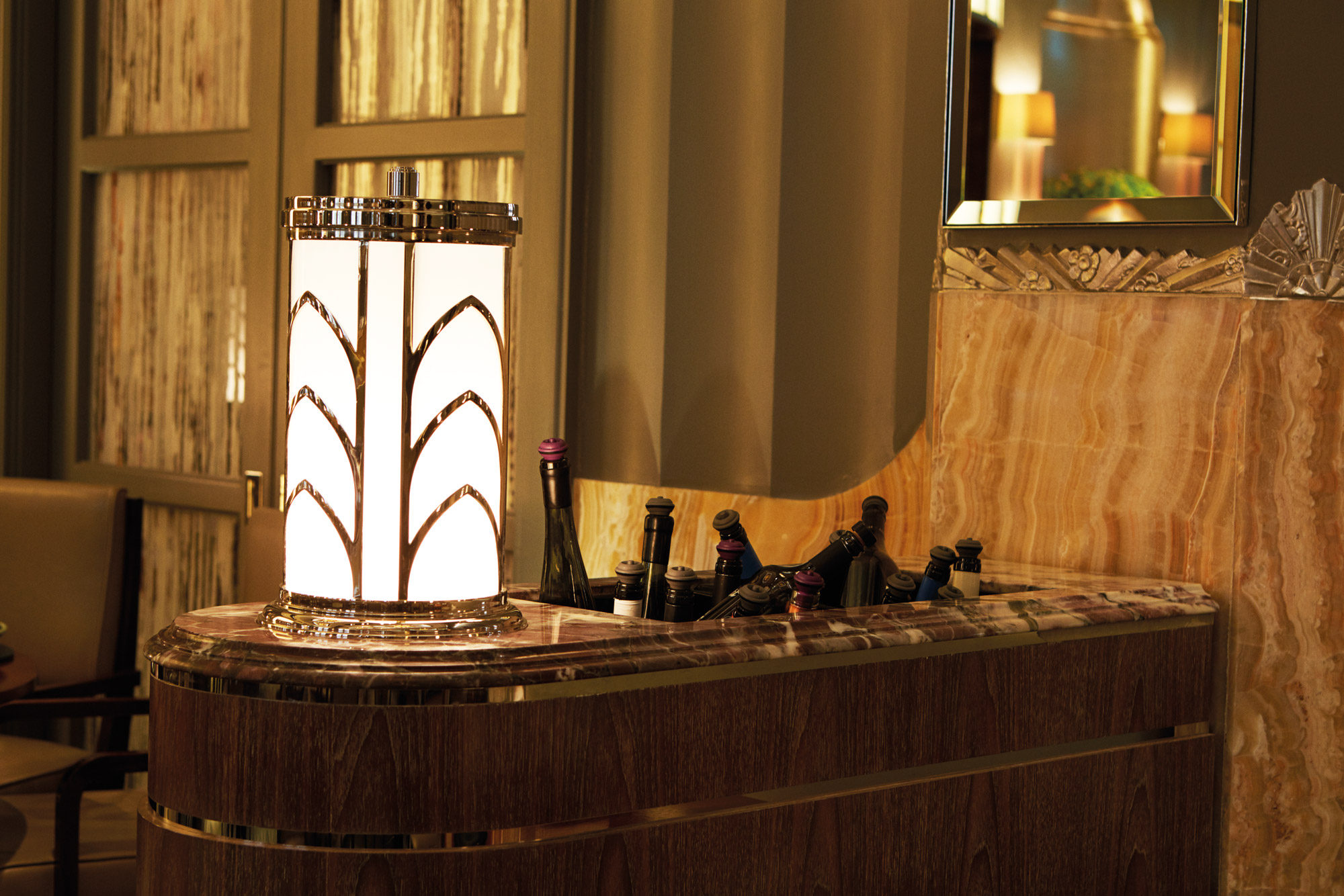
Rogan eschewed football for a weekend job at a Greek restaurant in Southampton. “I think I was getting £12 a night, £24 a week for two shifts, which in those days was a fortune,” he says. “I was probably the richest boy in my year. So I just got an appetite for it.” It wasn’t until he attended day-release catering college that the gas burner of passion was lit. “After two years in a restaurant, I thought I was going to stroll it,” he says. “Instead, I was absolutely terrible, because everybody else had worked in better places. That ignited my competitive nature: I didn’t want to be bottom of the class.” He transferred to the Rhinefield House Hotel in the New Forest, where the chef, who had been at The Savoy, gave him “an amazing apprenticeship.” Within six months, Rogan’s fortunes were reversed and he was top of the class; unfortunately, the money and lifestyle had also been exchanged for low pay and long hours: “But I was completely in love with what I was doing, and I wanted to be the best at it.” He went on to work for the likes of Marco Pierre White, John Burton Race and John-Cristophe Novelli, the latter a huge influence and godfather to his children. “He opened my mind up to the top, top, level of cooking,” says Rogan. “The glamour of it, and the ferocity too, the standards needed.”
The pressure-cooker stereotype of the high-level kitchen is that aspiring chefs must stand the heat of their superior’s fiery temper, not to mention the occasional chucked pan or brandished knife. Is it as nightmarishly hellish as it’s portrayed by “reality” TV shows? “Not at all, or not in my kitchen anyway,” says Rogan. “Although I’ve worked in some like that, back in the day.” Has the macho atmosphere fallen out of fashion then? “Oh, there are some guys that still do it,” he says. “How they get away with it, I don’t know. For me, standards are achieved by having a happy motivated kitchen team, not one that’s working to the limit, terrified to make a mistake.” In cooking, like in football, fear is rarely a recipe for successful man — and woman-management, and certainly not long-term. “For me to achieve what I want to, I need a team that stays with me for a long time,” says Rogan. “So we try to give people the right kitchen conditions, time off, pay and product. That way, you get a lot of work out of them, and it makes my job easier.”
“When you’re a young chef, it’s all testosterone and technique. Look what I can do: aren’t I clever? And I suppose over the years you grow up, mature. You realise that above all it’s about the taste and enjoyment … flavour”
Like football managers, chefs also need a philosophy: Rogan’s is product. It has its roots in his dad’s fruit and veg goody bag, and also in the New Forest. “The sous-chef at the Rhinefield House Hotel was a keen forager, so we used to go out in the afternoons picking wild mushrooms and the odd herb,” says Rogan, who was also inspired by French chef Mark Veratt’s use of hyper-local alpine ingredients to attempt something similar at L’Enclume. Its subsequent blossoming means that Rogan is now credited with pollinating the foraging trend in Britain, which has its pros and cons. “I was reading a newspaper the other day and someone was complaining about restaurants using loads of foraged foods, saying I was to blame,” he says. “Although it was good, because it shows I was the first. But there are a lot of people now that are just using foraged goods for the sake of it and to be honest a lot of them taste like shit.”
Food is an industry where fashions spring up then wither on the vine: being a trend-setter can, ironically, come back to bite you, as first the copycats ape your approach, then a new trend appears and suddenly you look out of date. “I suppose most of it is flattery: they’re copying your brand, your model, because it’s successful,” says Rogan. “That’s fair enough. What really annoys me is when people are not sincere about it: it’s quite obvious you’ve pinched that dish off me but you’re claiming it’s your own.” But instead of getting bogged down in mudslinging, he moves on. “Not completely dropping our ethos, but just making slight tweaks: maybe a difference in tableware, maybe a bit more polish and precision in the way we plate things,” he says. “That’s the key for me: always being in front.” For that reason, although foraging was a “natural” choice to connect a destination restaurant like L’Enclume to its surroundings, “we try to play that down a little bit now”.
Instead the focus is more on Rogan’s farm, located near Cartmel, which supplies 90% of L’Enclume’s ingredients with a degree of quality and freshness that the keenest forager would struggle to find elsewhere: the time from harvest to plate can be less than an hour. Sometimes to move forward, you have to go in the other direction. “We’ve take one step back from the cooking to looking at the actual growing, the perfect ingredients, so when it comes into the kitchen, you don’t really want to do too much to it,” says Rogan. “The food has become a lot simpler.” His cooking, like his clothing, has evolved to be more substantial and less ‘fashion’. “It was looks over taste maybe in the past,” he says. “When you’re young, it’s all testosterone and technique. Look what I can do: aren’t I clever? And I suppose over the years you grow up, mature. You realise that above all it’s about the taste and enjoyment. Obviously it’s still got to look good. But flavour is paramount.”
Where, though, does a masterchef find the satisfaction to nourish him during those long, hard services? Is it the intrinsic motivation of producing a perfect plate of food? Or is it the extrinsic motivation of pleasing customers and critics? “I think it’s a bit of both,” says Rogan. “It’s about doing the best that you possibly can, and just keeping your fingers crossed that people agree with your concept.” What motivates him is the elusive third Michelin star for L’Enclume. “It’s the only thing that really drives me on to achieve now,” he says. “But the most important thing is obviously the customers — to do the best product we can possibly do, with a full restaurant. And hopefully one day the star will come.”
Rogan is also motivated by trying to leave a legacy like that of the legendary chefs before him, many of whom he’s worked for. “For me, more than money or anything like that, the whole thing that drives me forward is to be known as someone that really made a difference during my time,” he says. Not so much for his championing of British produce, or foraging, but for producing chefs, which is a source of great pride: “There’s already a few of my guys that have Michelin stars already, and there’s a lot of talented people working for me that will go on to get them,” he says. “I’m not saying I’m going to be legendary, but I’d like to think I spawned a whole new breed, the next generation.”
Philosophers are fond of asking whether a falling tree makes a sound if nobody is there to hear it. So how does Rogan cook in private? “To be honest, I used to have a flat around the corner and it was stocked with Marks & Spencer ready meals,” he admits. Now, his partner Penny wears the chef’s jacket at home, allowing him to spend precious time with their young son: “She keeps me alive.” Cooking for arguably the best chef in the country must be intimidating prospect though? “Oh, she knows me by now. I’ll eat any old rubbish.”

